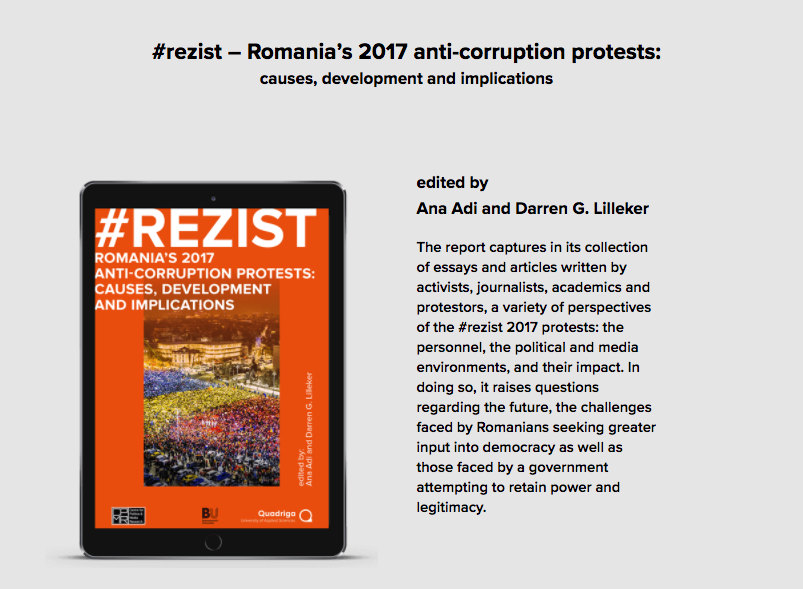The beginning of 2017 brought attention to Romania and its street protests against corruption. What started for me as a “watching the news unfold” exercise turned quickly into many questions that I could not answer on my own.
This is how the idea of a flash report on the Romanian protests came about.
#rezist – Romania’s 2017 anti-corruption protests: causes, development and implications is an online publication produced by Quadriga Media and published by Quadriga University of Applied Sciences. It has its own ISBN (978-3-942263-48-1), DOI (doi.org/10.23774/QUAS.RP2017.00) and bespoke website.
In effect, the report is a collection of 25 articles authored by journalists, academics, politicians, activists and protesters about the Romanian protests but also about their context, their development (in and outside Romania), some of their actors (whether politicians, protesters or lawmakers) and their implications.
From the report (you might find particularly intriguing):
- Monica Macovei’s, former Minister of Justice and current MEP, perspective on the European Union’s reactions to the protests
- Cosmin Pojoranu’s, from NGO Funky Citizens, overview of Romania’s protests post-2010 and the lessons in activist and strategic communication learned
- Raluca Feher’s, from Frontline Club Romania, reflection on her petition to advertisers to stop supporting fake news TV stations
- Dumitru Bortun and Bianca Cheregi’s, from the National University of Political and Administrative Studies, assessment of the “old†and “new†Romanias, personified by these protests
- Peter Gross’, from the University of Tennessee, evaluation of Romania’s path for the future, and
- my articles on protester profiles and the role of space and place in the protests touching also on the protests outside Romania.
What I have learned
This is not my first editorial endeavour but certainly the first multidisciplinary, international and online-aimed project with such a short deadline. It has required time and patience at every step, whether identifying and reaching out to potential contributions, getting support in-house for producing it (thank you awesome Quadriga team, you know who you are, for all the effort) or reading, editing, giving feedback and proofing the project.
For now, my hope (and Darren’s, my co-editor) is that the report is downloaded and read. Our next goal is to see the ways in which the report can contribute to furthering dialogue both in Romania but also in other communities (academic, political, cultural) to widening the discussion about democracy, ethics and responsibility of communicators (including advertisers), protest PR (whether there is such a thing), governmental communication and legitimacy, the EU…
So, if you read it (it’s free to download from www.romanianprotests.info) and have read it already, do get in touch and let me know your thoughts and if you find it interesting, then by all means, do share it (widely!).
